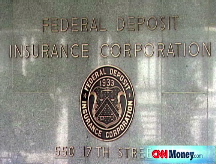Bank stocks surge, but...
A rescue package could unlock credit markets, providing much-needed relief for the industry. But even if a new bailout passes, more banks are likely to fail.
NEW YORK (CNNMoney.com) -- Hard-hit bank stocks rallied Tuesday, partly on hopes that the government would indeed pull off a rescue plan for the embattled industry.
But whether that happens or not, banks will hardly be insulated from further fallout, experts said.
Banks are coping with a laundry list of problems: an unwillingness to lend to one another, rising loan delinquencies, a weakening economy and further fallout in the U.S. housing market.
Investors were hoping that the proposed $700 billion bailout package would restore some calm following a tumultuous period that has included the collapse of Washington Mutual (WM, Fortune 500) and its subsequent takeover by JPMorgan Chase (JPM, Fortune 500) and Lehman Brothers' decision to file for bankruptcy.
The bailout package, however, was rejected in the House Monday, sparking a massive selloff in the sector and the biggest ever one-day point decline in the Dow.
The bill would have allowed the federal government to buy troubled mortgage-related investments from financial firms.
Proponents said it would enable banks to lend more freely and help end the credit crisis. Opponents argued that the bailout is an unbearable burden to taxpayers and an undeserved rescue for Wall Street.
But even if a bailout eventually passes, analysts say further losses and additional bank failures are inevitable.
So far this year, 13 institutions have failed, including WaMu, which ranks as the biggest ever in U.S. history.
However, if Congress fails to approve any sort of a rescue package in the coming days, the failures may happen much sooner, notes Seamus McMahon, a financial services partner at consultancy Booz & Company.
"Without a bailout, we will go straight from third to fifth gear," said McMahon, who previously served with foreign banking giants HSBC and Toronto Dominion Bank, helping to run their respective U.S. operations.
McMahon added that could mean more weaker banks will be pushed into the arms of stronger institutions, as was the case with Citigroup's (C, Fortune 500) acquisition of Wachovia's (WB, Fortune 500) banking assets on Monday.
There may also be more continued speculation on Wall Street about which bank is next to go under, said Anthony Davis, a senior equity analyst at Stifel Nicolaus who covers regional banks.
"People really are concerned about which body is going to be the next one we drag off the battlefield," said Davis.
For the time being, the promise of a rescue package appeared to soothe investors.
Bank stocks across the board rallied and outpaced the gains in the broader market on Tuesday. The S&P Banking Index finished nearly 14% higher, outpacing the Dow Jones industrial average's gain of 4.7%.
Shares of mid-sized regional banks, which were among the biggest losers on Monday, led the bank surge Tuesday.
Shares of Sovereign Bancorp (SOV, Fortune 500) soared to close up nearly 70% higher after the company replaced its CEO. Fifth Third Bancorp (FITB, Fortune 500) and KeyCorp (KEY, Fortune 500) jumped about 31% and 22% respectively.
Cleveland-based National City (NCC, Fortune 500), whose stock plunged nearly 60% Monday as investors worried that it could be the next bank to face severe financial pressure, ended nearly 29% higher.
"National City [on Monday] was trading like it was the next WaMu or Wachovia," said Sean Ryan, analyst for Sterne, Agee & Leach. "[But] I think there was a dawning recognition, looking at both their capital position and their liquidity position, that they appear to be on very safe ground."
Terry McEvoy, banking analyst for Oppenheimer, said investors have become less panicky and more savvy about distinguishing "the survivors versus those that will be consolidated, contributing to some of that snap-back for some of those banks."
Shares of top banks JPMorgan Chase, Wells Fargo (WFC, Fortune 500) and Bank of America (BAC, Fortune 500) all posted double-digit percentage gains. Shares of the former stand alone investment bank Goldman Sachs were up about 6%.
And Wachovia shares nearly doubled -- one day after its stock plunged to near worthless levels following the news of the asset sale to Citigroup.
Wachovia is holding onto its A.G. Edwards brokerage division and Evergreen investment management unit. The stock closed at $3.50 Tuesday, still a far cry from the $10 level it closed at on Friday. ![]()



